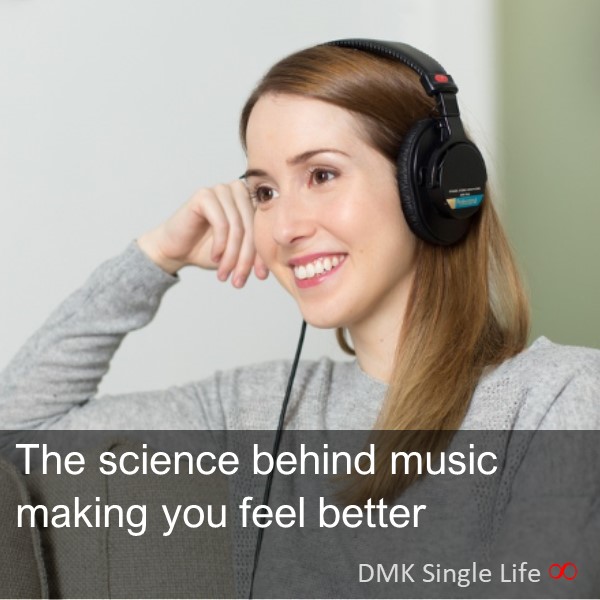You may not think much about why music makes you feel better. Sometimes the experience of something is enough to know it works.
Most could agree that music usually has positive affects on our mood. Scientific explanation should only add to our confidence in it's ability to provide therapeutic benefits.
Music and music therapy can alleviate symptoms of depression, anxiety and stress disorders. These are highly prevalent disorders that can worsen over time during major life changes, like divorce.
- According to the National Institute of Mental Health, depression affects 18.8 million American Adults, about 9.5% of the U.S. population age 18 or older on a given year.
-
Unlike sadness that subsides, depression is a persistent disorder that causes disruptions in emotions, normal activity and behavior. Pain, lethargy, hopelessness, low self-esteem and reduced cognitive ability are common physical symptoms.
-
Social Anxiety Disorder, also known as SAD, is the second most common anxiety disorder in the United States, second only to phobia related disorders. It includes increased perspiration, nausea, inability to speak clearly, trembling and fidgeting.
-
People who suffer from SAD fear being considered uninteresting, awkward or foolish. More than 15 million American Adults are diagnosed with this, yet, less than 5% of people with this disorder seek treatment within the first year following the initial onset. Moreover, most don’t seek a diagnosis for more than 10 years after the symptoms begin. Most symptoms begin in the late teen years, but can also develop later in life.
-
Post Traumatic Stress Syndrome, PTSD, is a condition where consistent emotional and mental stress develop as a result of dangerous situations, physical injury or psychological shock. Symptoms may include, flashbacks, feelings of guilt and anger, negative thoughts and difficulty sleeping.
According to the American Music Therapy Association, music therapy establishes therapeutic use of music to treat physical, emotional and cognitive needs of a patient by a music therapist who holds an MT-BC credential. This includes treatment for disorders to include anxiety, stress and depression. In addition to anxiety, stress disorders and depression, music therapy has been known to positively affect those suffering from Alzheimers, Parkinsons, insomnia and chronic pain. The treatment may be inclusive of multiple aspects of musical intervention to include singing, moving to-, creating or listening. The music therapist works closely with the patient to develop an appropriate course of music therapy that would provide the most benefit to the patient based on his/her diagnosis.
The effect music has on the individual is related to the patient’s ability to easily identify and express his/her emotions to music.
It's use in therapy is not the only means to benefit from the science behind the music.
Music in older adults has a positive effect on sleep patterns and is known to increase sleep quality, efficiency and duration. All of which improves the individual’s daytime function.
Music is known to stimulate the part of the brain that produces the powerful neurotransmitters responsible for pleasure and happiness. Neurotransmitters process electrical signals within the nervous system. The two most common of those chemicals are dopamine and endorphins.
Dopamine triggers the pleasure centers of the brain just like when you eat or sleep. It's a "feel good" hormone that stimulates creativity and expression of thoughts and feeling. It naturally makes people feel better, improves self-esteem, increases motivation and provides safe emotional release of tension.
Endorphins are also released into your blood stream when listening to music. There are at least 20 types of endorphins demonstrated in humans. They induce a natural sense of euphoria and happiness when mixed with serotonin and/or dopamine. They are linked to pain relief and easier recovery from illness or injury. They have also been shown to relieve symptoms of PTSD.
Immunoglobin A looks for viruses in your body and attacks them. Studies indicate these cells increase upon listening to music. This provides a natural boost to the body's immune system which assists in fighting current illnesses or for the prevention of new ones.
Cortisol is a stress hormone that is known to decrease when listening to peaceful music. This assists in decreasing anxiety and stress disorders among other diseases and disorders.
While studies and scientific data both continually prove music is beneficial to improving one's mood, self-esteem and happiness; history and culture also demonstrate benefits of its use and significance in these issues.
- Native Americans and ancient civilizations used music to communicate to their gods and nature. They believed it was part of their ability to heal and they used music as a means to socialize. They ultimately believed in the harmonic nature of mind, body and soul. If these were skewed in some way, harm was considered imminent.
- Chinese Medicine relates music, the theory of Yin and Yang to the five internal organ meridian systems. It's believed the spirit of music was the Tao, the difference in Yin and Yang, the balance of life and the tone and mood of the universe. They believe musical tones correspond to each internal organ and encourage healing.
- The United States employed the first use of music therapy during World War II when the medical staff used music to help patients with the physical and emotional experience they suffered during the war. Once the results of this therapy were recognized, an educational program was recommended to provide this type of therapy to others. This was the birth of music therapy as a recognized force in the treatment of multiple ailments.
History and science document the great value music has in healing. It can both prevent illness and be part of a natural therapeutic treatment. If you would like to find a board certified music therapist near you or learn more about music in therapy visit https://cbmt.org.
Regardless of all the facts and science behind music helping you feel better, sometimes after a hard day, you just need to turn on your favorite tunes and dance, sing or listen your blues and stress away!
Disclaimer
The information provided by respective owner's ("we", "us" or "our) on Divorce Me Knot (referenced also as "DivorceMeKnot.com", "dmk", "DMK", "OurDMK.com", "OurDMK", "application" or "site") is for general informational purposes only and is subject to change with or without notice. All information on our site and application is provided in good faith, however we make no representation, guarantee or warranty of any kind, express or implied, regarding the accuracy, validity, adequacy, reliability, availability or completeness of any information on the site or application.
The information in articles and all content on this site should not be considered psychological or behavioral health therapy, counseling or legal, financial, real estate, mortgage, insurance or professional advice. It should not be used in place of professional advice from a licensed professional or credentialed expert. Providers of content on this site, herein known as "Contributors" (inclusive of, but not limited to writers, bloggers, editors, employees, developers, graphic designers, advertisers, partners, affiliates, references, experts, professionals and site owners) are not legally liable for any misinformation, errors or omissions. Names, details and images may have been changed in the content of this site.
Under no circumstances should DMK and/or it's Contributors have any liability to users of the site for any loss or damage incurred to users as a result of the use of this site or application or reliance of any information provided on the site or application. Use of the site or application and reliance on any information from the site or application is solely at the user's own risk.
For complete site disclaimers review "Disclaimers" on this site or click the link below.
Read Complete Site Disclaimers Here











 How to resolve AdBlock issue?
How to resolve AdBlock issue?